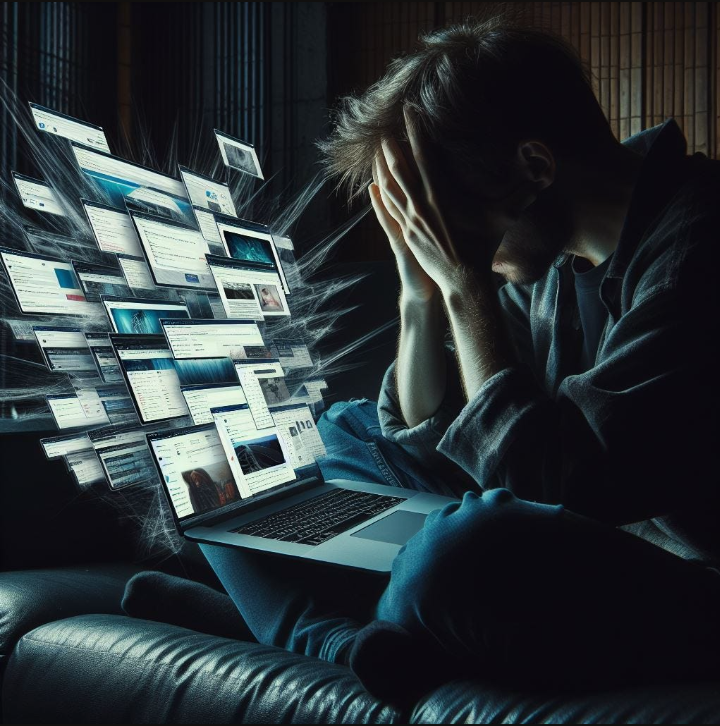Why Modern Life Makes Us More Anxious (and Simple Fixes)
Anxiety has always been part of the human experience. Our ancestors needed a healthy dose of worry to survive—fear of predators, storms, or starvation kept them alive. But the kind of anxiety many people feel today is very different. It’s not about outrunning lions or finding enough food to survive the winter. Instead, it’s about emails, deadlines, bills, traffic, and a constant flood of information that never seems to stop.
Modern life, with all its conveniences, has quietly created an environment where our bodies and minds feel constantly under siege. The result? More people than ever are wrestling with stress and anxiety. To understand why, we need to look at what daily life does to our brains—and then explore practical ways to calm it.

1. The Tyranny of Constant Connection
A hundred years ago, communication was slower and more deliberate. Letters took days, sometimes weeks. Even phone calls required careful timing. Today, we carry a buzzing device in our pockets that demands attention every few minutes. Work emails arrive at midnight, group chats explode with notifications, and social media tempts us to scroll endlessly.
The problem is that our brains interpret every ping and buzz as a potential demand for action. This constant connection keeps us in a state of alertness, never fully relaxed. Over time, it builds into chronic anxiety.

A simple fix is to create digital boundaries. Turning off non-essential notifications, setting “do not disturb” hours in the evening, or even leaving your phone in another room at night gives your nervous system a break. Reclaiming quiet moments—without the glow of a screen—lets your brain return to a calmer rhythm.
2. The Pressure of Endless Choice
Modern life promises freedom. Want a new pair of shoes? Thousands of styles are just a click away. Thinking about dinner? There are more cuisines at your fingertips than your grandparents ever dreamed of. But here’s the catch: endless choice is exhausting. Psychologists call it “decision fatigue.”
When faced with too many options, our brains work harder to evaluate, compare, and predict outcomes. This leads to second-guessing and dissatisfaction—even after we make a choice. Did I buy the wrong thing? Should I have ordered differently? Small decisions accumulate into background stress that wears us down.
One fix is to simplify. Limiting your choices—whether that means keeping a capsule wardrobe, planning weekly meals in advance, or setting default routines—reduces unnecessary mental strain. By embracing fewer choices, you preserve your energy for decisions that truly matter.
3. The Culture of Comparison
Social comparison isn’t new, but social media has turned it into a constant competition. A casual scroll shows friends on exotic vacations, colleagues announcing promotions, and influencers flaunting picture-perfect lifestyles. Even if you’re content, these curated glimpses of other people’s lives can trigger feelings of inadequacy.
The trouble is that most of what we see online is selective. We compare our everyday struggles to someone else’s highlight reel, and the result is predictable: anxiety, envy, and low self-esteem.
A practical fix is to curate your digital diet. Unfollow accounts that make you feel “less than,” and replace them with ones that inspire, educate, or genuinely entertain you. Another step is to practice gratitude—writing down three things each day you’re thankful for shifts focus away from what’s missing to what’s already present.
4. The Disruption of Natural Rhythms
Humans evolved in sync with natural cycles of light and dark. We woke with the sun, worked during daylight, and rested after sunset. Modern life disrupts this pattern with artificial lighting, late-night work, and screens that keep us awake long after our bodies crave rest. The result is widespread sleep deprivation, which directly fuels anxiety.
Poor sleep impairs emotional regulation. A tired brain interprets everyday challenges as bigger threats, making us more irritable, jumpy, and anxious. The cycle is vicious: anxiety disrupts sleep, and lack of sleep worsens anxiety.
Fixing this starts with respecting your body’s need for rhythm. Creating a sleep-friendly routine—dim lights in the evening, no screens an hour before bed, and consistent sleep and wake times—helps reset your internal clock. Exposure to natural daylight in the morning also anchors your circadian rhythm, making restful sleep easier to achieve.
5. The Weight of Constant Productivity
Modern culture often equates worth with output. From school to the workplace, the pressure to achieve, perform, and produce never ends. Many people feel guilty for resting, as if downtime is wasted time. This constant push to do more leads to burnout and, inevitably, anxiety.
Unlike past generations, who worked within clearer boundaries of time and task, modern work often seeps into every corner of life. The laptop on the kitchen table and the smartphone in your pocket blur the line between “on” and “off.”
A simple fix is to embrace the idea of rest as productive. Scheduling downtime—whether it’s a walk, an afternoon nap, or a hobby that brings joy—can recharge mental energy and make work hours more effective. Giving yourself permission to be unproductive is not laziness; it’s maintenance for long-term well-being.
6. The Erosion of Community
Despite being more connected than ever digitally, modern life has left many people feeling isolated. Traditional communities—extended families, neighborhood networks, religious groups—are less central than they once were. Instead, many of us live in cities surrounded by strangers or in suburbs where people rarely interact.
Loneliness is more than an emotional state; it’s a health risk. Studies link social isolation with higher rates of anxiety, depression, and even physical illness. Our brains are wired for belonging, and when that need isn’t met, we suffer.
One fix is to invest intentionally in relationships. That might mean scheduling regular meetups with friends, volunteering, or joining local clubs. Even small interactions—chatting with a neighbor, attending community events—can reduce the sense of isolation. Building real-world connections creates a buffer against anxiety.
7. The Overload of Information
The modern world delivers a nonstop stream of information. News headlines, push alerts, podcasts, and endless articles make it hard to switch off. Our brains are forced to process more data in a single day than our ancestors absorbed in weeks. The constant exposure to negative news—wars, disasters, economic troubles—keeps us in a low-level state of fear.
Information overload leads to “analysis paralysis” and makes it harder to focus. It also trains the brain to expect danger around every corner, a perfect recipe for anxiety.
The fix is to practice information fasting. Choosing specific times of day to check the news, limiting social media, or having screen-free mornings can prevent overload. Quality matters more than quantity—reading one reliable source deeply is often healthier than skimming ten different headlines that only raise your heart rate.
8. The Loss of Nature
For most of history, humans lived close to nature. Modern life, however, is largely indoors, often under fluorescent lights and surrounded by concrete. This disconnect has subtle but powerful effects on mental health. Research shows that time in green spaces reduces stress, lowers blood pressure, and calms anxious thoughts.
When we’re cut off from nature, our nervous systems remain in a state of tension. Something as simple as walking in a park, gardening, or sitting near trees can restore balance. Nature offers quiet rhythms and sensory experiences that reset frazzled minds.
A simple fix is to schedule daily doses of the outdoors. Even 20 minutes of walking outside can reduce cortisol levels and bring perspective. Making nature a regular habit—not an occasional luxury—offers lasting relief from the grind of modern life.
9. The Myth of Multitasking
Modern life praises the ability to juggle multiple tasks at once. We answer emails during meetings, cook while scrolling through messages, and switch between apps as if it saves time. In reality, multitasking doesn’t make us more efficient—it makes us more anxious.
Each time we switch tasks, the brain uses energy to refocus. This creates mental clutter and reduces overall productivity. The nagging sense of never finishing anything properly fuels frustration and worry.
The fix is to embrace single-tasking. Choosing one priority at a time and giving it full attention not only improves quality but also creates a sense of calm accomplishment. Building small rituals, like clearing your desk before starting a project, helps reinforce the practice.
10. The Forgotten Power of Breathing
Perhaps the simplest but most overlooked factor in modern anxiety is our breathing. Fast-paced living often leads to shallow, rapid breaths, which signal the body to stay in “fight or flight” mode. This keeps anxiety simmering in the background.
A practical fix is mindful breathing. Techniques like slow belly breathing, box breathing (inhale for four, hold for four, exhale for four, hold for four), or simply taking five deep breaths before a stressful task can reset the nervous system. Unlike therapy or medication, breathing is free, instant, and always available.
Modern life has given us incredible tools, comforts, and opportunities. But it has also created an environment that constantly strains our minds. From endless screens to shrinking communities, the world around us often pushes us into states of worry and stress.
The good news is that anxiety doesn’t have to be permanent. By making small, intentional choices—limiting information, restoring natural rhythms, reconnecting with people, and embracing simplicity—we can reclaim peace in a noisy world. The fixes may be simple, but their effects are profound.


You must be logged in to post a comment.